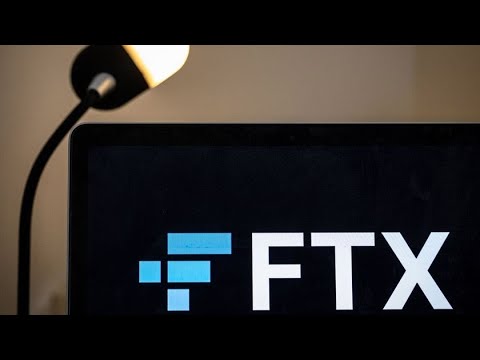
Hey there! In this article, titled “FTX Bankruptcy Team Meeting With Federal Prosecutors,” the focus is on an interview with a representative from a bankruptcy team at FTX. The video, conducted by Bloomberg Technology, delves into the concept of ETFs (Exchange-Traded Funds) and how they benefit investors. The representative explains that their ETF gives investors access to the inverse performance of stocks that are highly correlated to the price of Bitcoin and the overall cryptocurrency ecosystem. They also discuss the importance of shorting equities related to crypto as a way to capture market fluctuations and provide investors with tools to represent both sides of the trade. The conversation touches on the potential long-term rebound of crypto-related equities, the demand for long positions in the sector, and the challenges faced in gaining exposure from a regulated perspective. Looking ahead, the article explores the need for more ways to navigate the evolving crypto market and the potential impact of future regulations on the industry.
Overall, this engaging article aims to provide valuable insights into ETFs, their benefits, and their role in the ever-changing cryptocurrency landscape. It delves into the intricacies of shorting equities, explores investor demand, and highlights the challenges faced in gaining regulated exposure. With an informative tone and a friendly approach, this article serves as a must-read for those interested in understanding the dynamics of ETFs and the broader cryptocurrency market.
FTX Bankruptcy Team Meeting With Federal Prosecutors
Overview of FTX Bankruptcy Case
The FTX bankruptcy case revolves around the financial collapse of the FTX cryptocurrency exchange, which was once a prominent player in the industry. The bankruptcy was mainly caused by financial mismanagement, potentially fraudulent activities, and non-compliance with regulatory standards. As a result, the exchange was unable to meet its financial obligations, leading to significant losses for stakeholders, including investors, employees, and creditors. The case has garnered significant attention due to its potential impact on the cryptocurrency industry and the need for accountability.
Background of Federal Prosecutors’ Involvement
Federal prosecutors have become involved in the FTX bankruptcy case due to the severity of the allegations against the exchange. The involvement of federal prosecutors is not uncommon in bankruptcy cases that involve potential criminal activities. As the collapse of FTX may have resulted from financial misconduct and possible fraudulent activities, federal prosecutors aim to investigate these allegations and hold responsible parties accountable. Their involvement signifies the seriousness of the case and the potential legal consequences for those involved.
Objectives of the Meeting
The primary objective of the meeting between the FTX Bankruptcy Team and Federal Prosecutors is to facilitate the exchange of information and clarify the bankruptcy proceedings. Both parties aim to understand the extent of the financial mismanagement, identify responsible parties, and determine the potential for asset recovery. Additionally, the meeting serves as an opportunity to establish cooperation between the FTX Bankruptcy Team and federal prosecutors, ensuring a streamlined legal investigation and potential criminal proceedings if warranted.
Issues Discussed
During the meeting, several critical issues were discussed regarding the FTX bankruptcy case. These issues include financial mismanagement by FTX’s management team, potential fraudulent activities that may have contributed to the collapse, and allegations of insider trading. The compliance of FTX with regulatory standards was also examined, as the exchange’s failure to adhere to these standards may have played a significant role in its downfall. The identification of responsible parties and the recovery of investor funds were other significant issues explored during the meeting.
Key Players in the Meeting
The meeting involved various key players relevant to the FTX bankruptcy case. The FTX Bankruptcy Team, consisting of legal representatives and financial experts, was present to represent the interests of FTX in the legal proceedings. Federal prosecutors, including attorneys specializing in financial crimes, represented the government’s interests in investigating potential criminal activities. Representatives of stakeholders, including investors, employees, and creditors, were also present to ensure their concerns and perspectives were considered. Legal counsel for FTX and expert witnesses provided additional insights and advice. Regulatory authorities, such as the Securities and Exchange Commission, were observers in the meeting and provided guidance on compliance-related issues.
Timeline of the Meeting
The meeting followed a well-structured timeline to ensure an efficient and productive discussion. Prior to the meeting, preparations were made to facilitate logistics, including arranging the venue, scheduling participants, and gathering relevant documents and evidence. The meeting commenced with introductions and opening statements from the FTX Bankruptcy Team and federal prosecutors, outlining their objectives and expectations for the meeting. The FTX Bankruptcy Team presented their findings and evidence, followed by questioning and cross-examination by federal prosecutors and other participants. Discussions on legal strategies, potential outcomes, and next steps were held, leading to an agreement on the course of action. The meeting concluded with an adjournment, with participants aware of their responsibilities and the timeline for further legal proceedings.
Legal Implications
The FTX bankruptcy case carries several significant legal implications. The potential criminal charges that may arise from the investigation include fraud, insider trading, and violations of securities laws. If criminal misconduct is established, individuals found guilty could face imprisonment and significant fines. Civil lawsuits may be initiated by stakeholders seeking financial restitution for their losses. Asset seizures may occur to recover funds defrauded from investors. Regulatory penalties, such as sanctions, fines, or even suspension of operations, may be imposed if FTX is found to have violated regulatory standards. Additionally, the case highlights the need to explore bankruptcy resolution options that prioritize the interests of stakeholders and the fair distribution of remaining assets.
Possible Outcomes
The FTX bankruptcy case may result in various outcomes depending on the findings and subsequent legal proceedings. Criminal prosecution and convictions could hold responsible parties accountable for their actions, serving as a deterrent for potential financial crimes in the future. Financial restitution may occur if civil lawsuits are successful, allowing affected stakeholders to recover a portion of their losses. A bankruptcy settlement could be reached, distributing the remaining assets among stakeholders based on their respective claims. Ultimately, the case is expected to have industry-wide repercussions, leading to a need for stricter regulations and improved investor protection in the cryptocurrency market.
Public Perception and Investor Confidence
The outcome of the FTX bankruptcy case will undoubtedly have implications for public perception and investor confidence in the cryptocurrency industry. If the investigation reveals substantial financial misconduct and fraudulent activities within FTX, it may lead to a loss of trust in the exchanges and firms operating in the industry. Investors may become more reluctant to participate or consider cryptocurrency investments as a result. However, if the legal proceedings effectively hold the responsible parties accountable and demonstrate a commitment to enforcing regulations and protecting investors, it may restore or enhance public perception and investor confidence in the industry.
Implications for the Cryptocurrency Industry
The FTX bankruptcy case’s implications extend beyond the specific exchange and stakeholders involved. The case highlights the need for stronger regulatory oversight and enforcement to prevent similar incidents in the cryptocurrency industry. Regulators may introduce stricter guidelines and requirements to protect investors and ensure the financial stability of cryptocurrency exchanges. It may also necessitate industry-wide discussions on best practices, transparency, and accountability to maintain integrity and market confidence. The FTX case serves as a reminder that responsible and ethical practices are crucial for the continued growth and sustainability of the cryptocurrency industry.

This image is property of i.ytimg.com.
Overview of FTX Bankruptcy Case
Summary of FTX Bankruptcy
The FTX bankruptcy case stemmed from the collapse of the FTX cryptocurrency exchange, once considered a major player in the industry. The exchange filed for bankruptcy due to financial insolvency, rendering it unable to meet its obligations to stakeholders, including investors, employees, and creditors. The bankruptcy filing indicated significant losses and raised concerns regarding the mismanagement of funds within the exchange.
Reasons for Bankruptcy
The primary reasons for the bankruptcy of FTX are attributed to financial misconduct, potential fraudulent activities, and non-compliance with regulatory standards. Investigations revealed misappropriation of funds, violation of fiduciary duties, and misleading accounting practices. Additionally, allegations of potential insider trading and manipulation of cryptocurrency prices further exacerbated the situation. These factors eroded investor trust and confidence in FTX, ultimately leading to the decline and subsequent bankruptcy of the exchange.
Impact on Stakeholders
The bankruptcy of FTX had a significant impact on various stakeholders associated with the exchange. Investors, who held cryptocurrency assets or funds within the exchange, faced substantial losses as the value of their holdings plummeted. Additionally, employees of the exchange were left with uncertain job prospects and potential financial instability. Creditors, who had extended loans or provided services to FTX, faced challenges in recovering their debts due to the bankruptcy proceedings. Overall, the collapse of FTX showcased the vulnerability of stakeholders in the cryptocurrency industry and the importance of regulatory safeguards.
Current State of Affairs
Currently, FTX is undergoing bankruptcy proceedings, with a focus on asset recovery and the equitable distribution of remaining assets among stakeholders. The appointed bankruptcy trustee is working closely with legal professionals and financial experts to assess the extent of the exchange’s liabilities and devise a strategy for maximizing asset recovery. Stakeholders are being kept informed of the progress through regular updates and are encouraged to file claims to ensure their interests are considered throughout the process. The bankruptcy proceedings are being closely monitored by regulatory authorities and federal prosecutors, who are actively involved in the investigation of potential criminal activities.
Recovery Efforts
Efforts to recover assets for stakeholders in the FTX bankruptcy case are underway. The appointed bankruptcy trustee is conducting a thorough review of the exchange’s financial records, transactions, and asset holdings to identify possibilities for recovery. This includes exploring potential legal actions against responsible parties, pursuing claims against third parties involved in fraudulent activities, and coordinating with regulatory authorities to leverage their power for asset recovery. The goal is to ensure the maximum recovery possible for stakeholders, minimizing the financial losses resulting from the bankruptcy.



